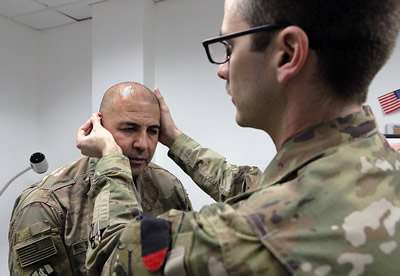DETROIT—Using acupuncture in veterans facing surgery resulted in less post-surgical pain and the use of fewer opioids to manage it, according to new research.

An Air Force doctor, Capt. Carl Bryce, places a Battlefield Acupuncture needle into the outer ear area of Chief Warrant Office 2 George Scott last year at the Craig Joint Theater Hospital at Bagram Airfield, Afghanistan. Now, the technique has shown success in controlling post-surgical pain and reducing use of opioids. Army photo
The randomized, controlled study was presented at the Anesthesiology 2020 annual meeting and found that VA patients who received acupuncture also were more satisfied with their pain control than those who did not.
“Six percent of patients given opioids after surgery become dependent on them, and veterans are twice as likely to die from accidental overdoses than civilians,” explained lead author Brinda Krish, DO, an anesthesiology resident at Detroit Medical Center, “Clearly it is crucial to have multiple options for treating pain, and acupuncture is an excellent alternative. It is safe, cost-effective, and it works.”
Both traditional and battlefield acupuncture were used in the study. Traditional acupuncture involves the insertion of very thin needles at specific trigger points around the body to relieve pain, while battlefield acupuncture, developed by a U.S. Air Force doctor to reduce pain without the use of opioids on the front lines, employs tiny needles that are inserted at various trigger points in the ear, according to background information in the report.
The researcher was conducted at the John D. Dingell VAMC in Detroit and involved two groups: One received hip replacement surgery, with 21 patients randomly assigned to either traditional acupuncture and 21 to a control group before surgery, while the other included patients undergoing a variety of surgeries—gallbladder removal, hernia repair, hysterectomy or prostate surgery—who were randomly assigned to receive battlefield acupuncture, 28 patients, or to a control group, 36 patients, before surgery.
Researchers described how those who had traditional acupuncture consumed an average of 20.4 of morphine milligram equivalent (MME) in the first 24 hours after surgery, while patients in the control group consumed 56 MME, nearly triple the amount.
In addition, traditional acupuncture patients reported significantly higher satisfaction scores regarding their postoperative pain management 24 hours after surgery—median 8 vs. 5 on a 10-point scale with 10 being completely satisfied. Not only did acupuncture patients report less pain, 14% said they had less anxiety.
In the second group, those who had battlefield acupuncture consumed half as many opioids in the first 24 hours after surgery compared to the control group: 17.4 MME vs. 35 MME. The acupuncture group also had significantly lower pain scores and higher patient satisfaction scores—a median of 8 vs. 6—compared to the control group. Only 3% reported nausea and vomiting after surgery, compared to 38% of the control group.
Researchers suggested that nausea and vomiting might have been reduced in the treatment group because some of the acupuncture points in the ear are located near trigger points for the stomach, gallbladder and small intestine.
“Some patients were open to trying acupuncture right away, and others became more interested when they learned more about the risks of opioid use,” Krish recounted. “It’s easy, patients love it, it’s not just another medicine, and it’s very safe. Because battlefield acupuncture was developed by an armed services doctor, Veterans also were more willing to participate.”
Acupuncture was provided by the study’s principal investigator, physician anesthesiologist Padmavathi Patel, MD, who has plans to use battlefield acupuncture as an additional therapy for pain management for all patients receiving general anesthesia, Krish added.
Background information in the article explained that acupuncture techniques have been in existence for centuries, with roots in eastern Asian medicine.
“Ease of application, low cost and minimal side effects make traditional acupuncture a perioperative modality that has been linked to decreased morbidity and mortality in patients undergoing surgical procedures and anesthesia,” the authors wrote. “In the United States, in light of the opioid epidemic, there is a strong need to decrease perioperative opioid use.”
The report described how opioid use for postoperative pain, along with perioperative anxiety, contributes to increased length of hospital stay, increased morbidity and mortality, and higher healthcare costs.
“In this pilot study, there was a significant reduction in post-operative opioid use and post-operative pain levels in patients who underwent TA and BFA compared to control patients undergoing standard of care perioperative treatment, according to the researchers. “Administration of BFA and TA techniques performed by trained personnel for patients undergoing surgical procedures may be an effective perioperative treatment method for a low cost, low risk method to reduce post-operative opioid use and post-operative pain.”
- 1. Krish B, Patel V, Baldawi M, Patel P, et. al. Traditional Acupuncture And Battlefield Acupuncture Use In Mutimodal Perioperative Anesthesia Care For Our Veteran Patients. Presented at The Anesthesiology Annual Meeting Oct. 2-5, 2020

